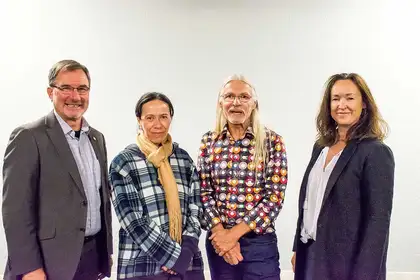
From left: Distinguished Professor Paul Spoonley, playwright Helen Pearse-Otene, cinematographer Waka Attewell and film producer Isobel Mebus at the preview screening of Undertow.
Massey University’s College of Humanities and Social Sciences celebrated its four-year partnership with Te Rākau Theatre Trust this month with a preview screening of Undertow, a powerful new film due for release next year.
Undertow is the 110-minute cinematic adaptation of four plays by Te Rākau co-director Helen Pearse-Otene, a Massey School of Psychology PhD candidate and renowned Māori playwright. It tackles major historical moments in Aotearoa’s collective stories: from the activities and assumptions of the New Zealand Company, to the Taranaki land wars, the battle of Passchendaele and the Viet ‘Nam War, to current day urban development.
Filmed by celebrated cinematographer Waka Attewell, Undertow captures the plays’ award-winning 2017 performances at Te Papa Tongarewa in vivid close-up. The story is then condensed and layered with an emotive, original score to deliver a compelling cinematic narrative about biculturalism, identity and Aotearoa’s place in world history.
The film’s producer Isobel Mebus said Undertow will be released in 2019 to coincide with the 250th anniversary of the first encounters between Māori and Pākehā on Aotearoa soil.
The College of Humanities and Social Sciences has partnered with Te Rākau, New Zealand’s longest-running Māori theatre company, since 2014. This has included providing rehearsal space and access to specialised theatre facilities for development performances of Undertow. Three of the four plays have had development showings at the University’s Wellington campus, enabling staff and students to learn from seeing them work-shopped and revised through the development process. The college has also provided seed funding to support production of the plays and film, seeing them as crucial contributions to bicultural understanding and excellent teaching and learning resources.
Pro Vice-Chancellor College of Humanities and Social Sciences Distinguished Professor Paul Spoonley said “Our association with The Undertow has been a really exciting development for us”.
“The College of Humanities and Social Sciences has been privileged to work with and support The Undertow as it develops community participation and understanding, via theatre, of the bicultural history of Aotearoa. The end product is an emotionally charged and powerful narrative about this country and its peoples.”
Playwright Helen Pearse-Otene conducted extensive archival and oral history research, grounding her narratives in historical events but bringing them to life through fictional characters. She highlights both pivotal moments and lesser known stories, such as the confiscation of Māori lands in the name of the war effort while the landowners were “fighting for King and Country”, and a nuanced exploration of post-traumatic stress disorder using verbatim testimony from New Zealand Viet ‘Nam veterans.
Ms Mebus said there would be commemorations throughout the country next year to mark the “first contact” milestone and differing opinions and emotions would be expressed. “This is an opportunity for New Zealanders to take an honest, healing look at our history,” she said.
Ms Mebus said the 250th anniversary commemorations had been given the Maori name Tuia, “meaning to weave together, symbolising bringing people together in unity”.
“The Undertow film can play an important role in this and our distribution plan involves not only showing it in cinemas but sharing the film throughout communities, in places where people can gather together to use the film as a starting point for their own kōrero. We see the film as a tool for inspiring storytelling and connection in communities, for both Māori and Pākehā.”